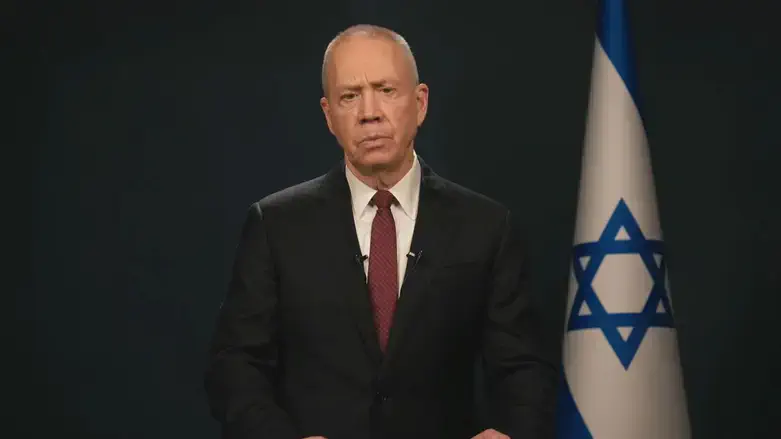
Former Defense Minister Yoav Gallant claimed to Channel 12 News, in an interview which aired on Thursday evening, that the IDF Chief of Staff was aware of the extent of the infiltration by Nukhba terrorists into Israel from the very first stage of the October 7, 2023 attack.
When asked how he received the news at 6:29 a.m. on October 7 about the Hamas attack, he replied, "My daughter calls me from Tel Aviv and says to me: 'There are sirens in Tel Aviv'. A minute later, I call the Chief of Staff, and he tells me: 'It's from Gaza, it's not just rockets, there's something ground-based here too - I'm going into a situation assessment.'"
Gallant praised the Chief of Staff but spoke differently about Prime Minister Benjamin Netanyahu. "I think the Prime Minister was in a very gloomy mood, not just that day, but also afterwards on October 11 and even before the maneuver; there was a very pessimistic atmosphere of which I was not a part. The outlook was very pessimistic, that we need to be focused, sober in order to make a proper situation assessment."
When asked about the IDF’s response in the first hours of the attack, Gallant said, "The transition from a state of rapid movement to hitting a wall requires a process of preparation. This process takes time. When there are four battalions in the area and you need to bring in more battalions, you have to bring them either from training or from Judea and Samaria or from elsewhere, this process takes time. Those who arrive first are the special units, followed by the special infantry battalions, and then everyone else. In my opinion, this is a point of failure that we must investigate in a state commission of inquiry, not just in a military probe, we must discuss this. If there's one thing that is the most profound frustration I have in life - it's that I wasn't woken up that night. I'm sure I would have asked, could you be underestimating the threat, is there something more significant? The implication would have been to bring in more aircraft and ground forces, certainly the commanders."
Gallant claimed he warned against the judicial reform which, he opined, harms Israel's security. "The information I share with the public is just the tip of the iceberg regarding what is known within the defense establishment, known to the Prime Minister and everyone else. I take it very seriously. The reform has effectively been halted in many respects as a result of this move."
Gallant said that it was only during the war that he heard about the “Jericho Wall” document, a 40-page document obtained by Israeli officials that outlined a hypothetical Hamas attack on southern Israel. "The term 'Jericho Wall' - I didn't know it. I am frustrated because it connects two things. One, what happened until October 7th, and the second is the night of October 7th. They need to investigate me, the Prime Minister, the Chief of Staff, the head of the Shin Bet, everyone else. I don't want to determine the results beforehand; I will accept whatever a commission of inquiry says. We also need to go back a decade because there are conditions here that created this. There was a large influx of Qatari money, there was a rift in Israeli society, and there were also Israeli provocations like ascending the Temple Mount and other things."
The former Defense Minister claimed that not attacking Hezbollah in the first days of the war was a grave mistake. "This, in my opinion, is the greatest security blunder of the State of Israel since its establishment. We knew senior Hezbollah members were going to gather. We should have launched an air strike and eliminated the heads of Hezbollah, including Iranians, Nasrallah, and everyone else, the entire Hezbollah leadership. Immediately afterwards, we would have implemented the attack plan on all their missile and rocket arrays as we did almost a year later in September, and we would have achieved not 70 or 80 percent success, but 90 percent or more because a large part of the rockets were concentrated in warehouses. And thirdly, the story of the beepers: those we encountered when they exploded a year later in Lebanon. The operation was planned well before the war. The implication would have been that Hezbollah as a military organization would cease to exist: no leadership, no missiles or rockets, most of the operatives killed on the ground - days after October 7th."
But his opinion was not accepted. "I go back to the Prime Minister and tell him, 'We must do this.' He shows me the buildings in Tel Aviv from the window and says: 'Do you see these buildings? All of this will be destroyed as a result of Hezbollah's residual capability. After we hit them, they will destroy everything you see with your eyes.'"
He criticized the thwarting of his move by Netanyahu, Benny Gantz, and Gadi Eisenkot. "The fight to launch the maneuver was not easy. I was with the forces already on October 8th; the message from the forces was ‘you always tell us this, and it never happens.’ And after a week, it was like, ‘Release us from reserve duty because you're not serious.’ When I returned to the Cabinet discussion, it became clear to me that there were people there, whose political experience was greater than mine or whose military rank in reserves was higher than mine, who thought the same thing. There was a fight here. All of this takes time; in the end, the Chief of Staff and I brought about this decision."
